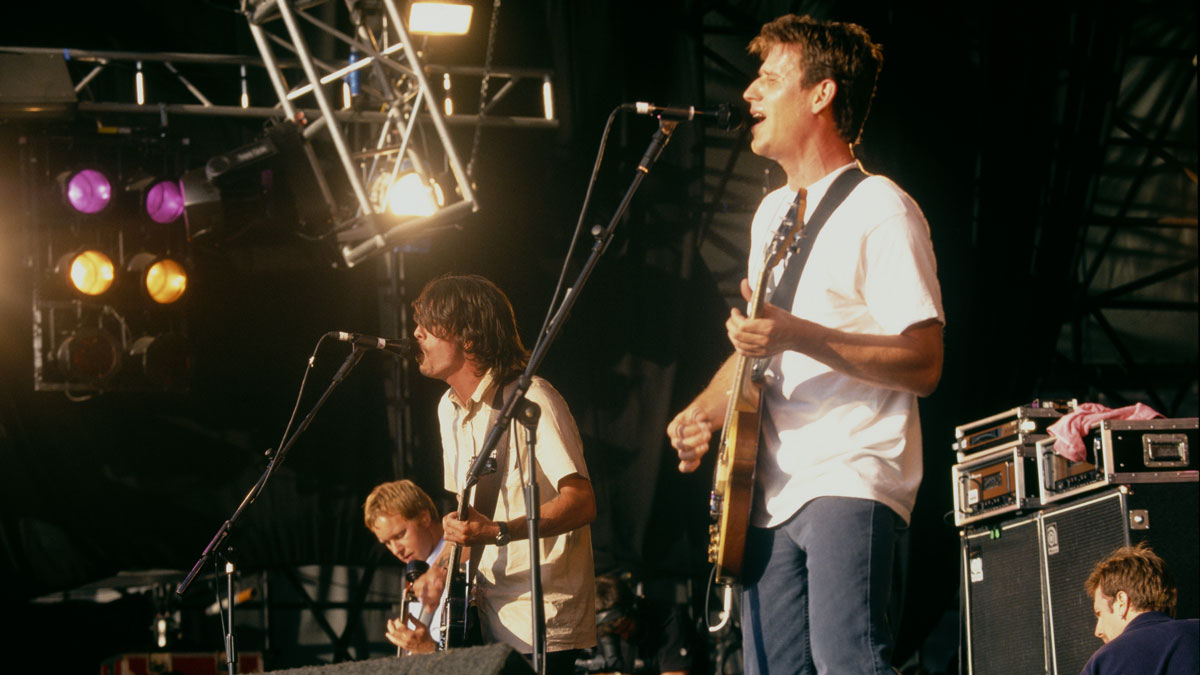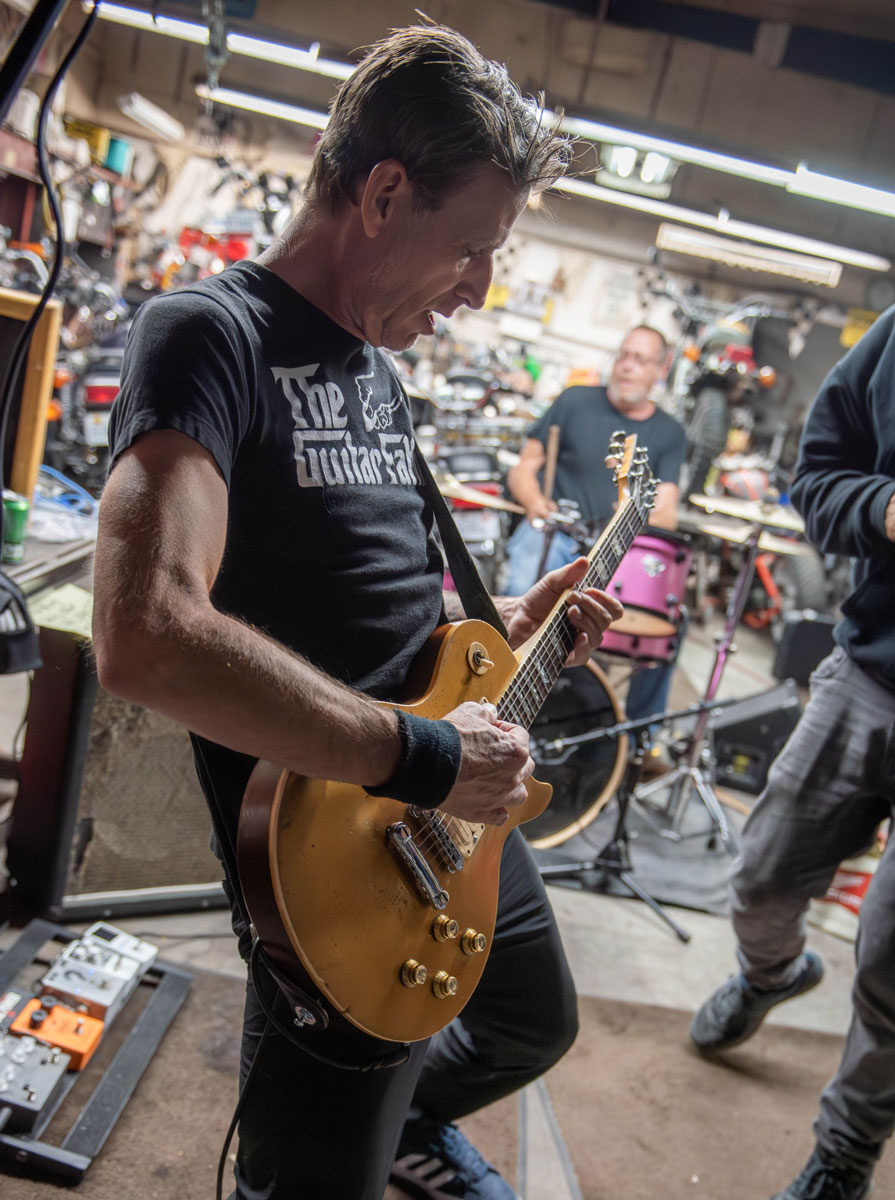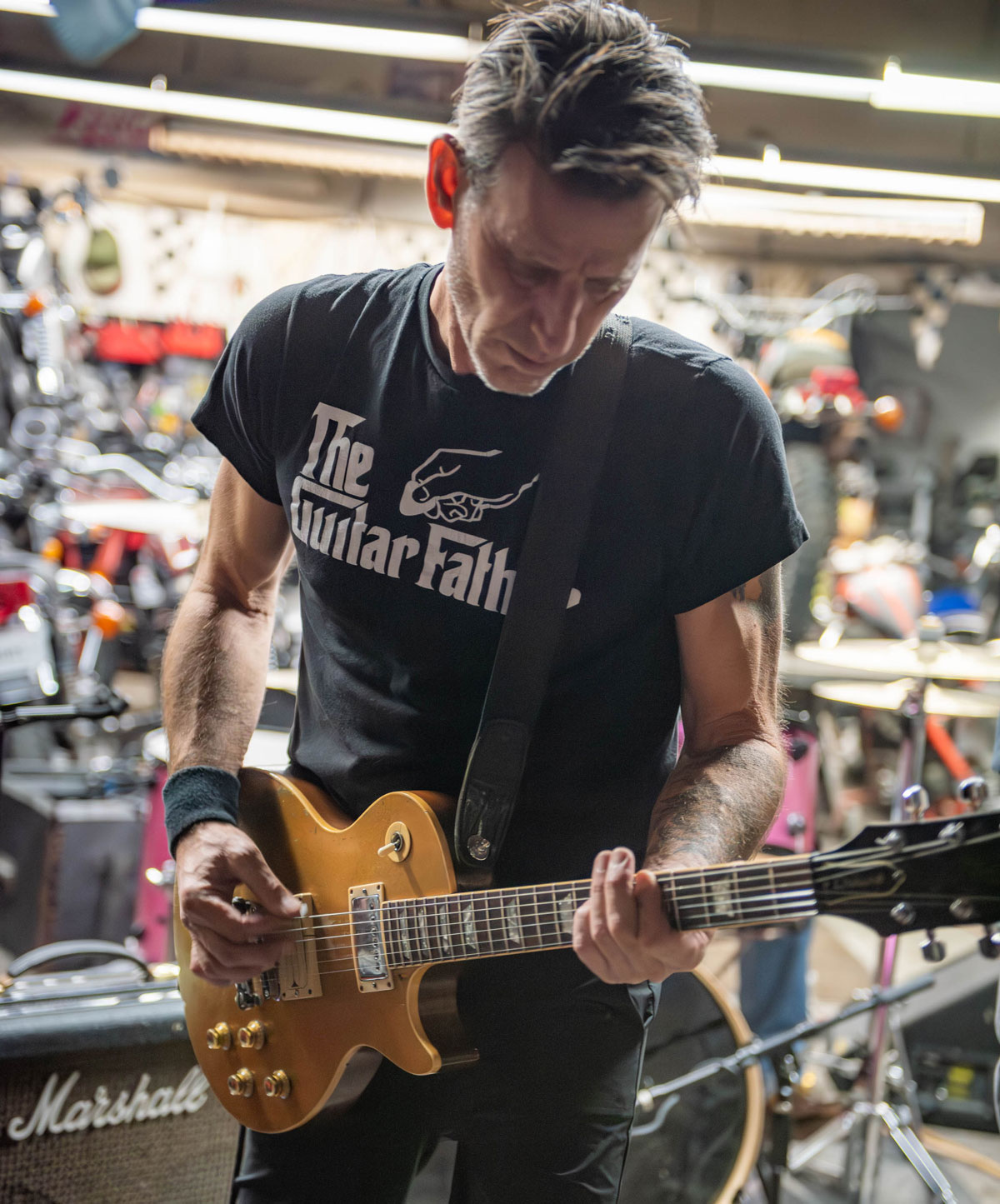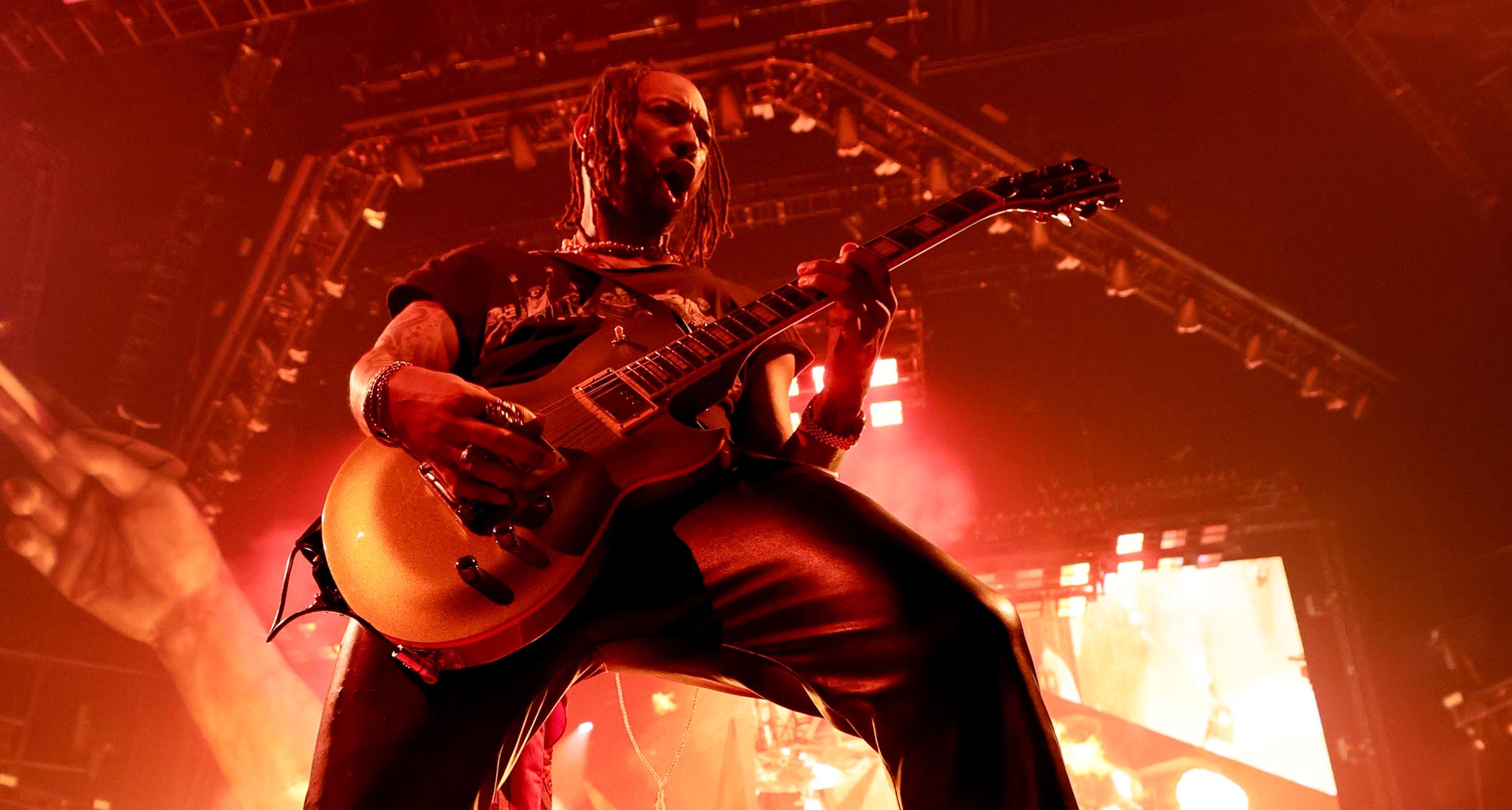“From the second I got the call to join Foo Fighters, I hit the ground running. This was Dave's band, and I was the new guy – it was about not stepping on toes”: Franz Stahl on his time in the alt-rock institution – and Scream's first album in a decade
Featuring members of Bad Religion and Bad Brains, Scream's forthcoming record celebrates their D.C. roots – guitarist Franz Stahl explains how Dave Grohl upped the punk stalwarts' game, why striking a chord is more powerful than any solo, and how he ended up playing a Strat in the My Hero video – despite not owning one

All the latest guitar news, interviews, lessons, reviews, deals and more, direct to your inbox!
You are now subscribed
Your newsletter sign-up was successful
Perched alongside his brother Peter Stahl, Virgina-based rocker Franz Stahl founded Scream in 1981, injecting themselves into the heart of a scene that was already flourishing via the likes of Bad Brains, Youth Brigade, and Minor Threat.
Now over 40 years later and having been dormant from a studio perspective for well over a decade, Stahl and his cohorts are back with their latest record, D.C. Special, which features a host of friends and scene mates that aided in making Scream one of the most revered bands out of the D.C. area.
"We called this one D.C. Special because we've got a ton of people that we've become close with on this one," Stahl tells Guitar World. "We've got Brian Baker from Bad Religion, Darryl Jenifer from Bad Brains, and a whole bunch of others. We expect the record out in the fall, but to be honest, we haven't been given a hard date."
Of course, there's another side to Franz Stahl's guitar coin. Many will recall that he served as a member of the Foo Fighters from 1997 through 1999, joining as a replacement for Pat Smear.
Looking back on his tenure as a member of the Foo Fighters, and what set him adrift after only two years, Stahl says, "I've always wanted to be the type of player that just gets up there and delivers power. I never thought I was that great technically, and solo-wise, I can mimic some stuff, but my wheelhouse just differed a little bit."
He continues, "As a performer and writer, I definitely do not come from the technical side; it's more about the joy of just writing music and then going out and ripping up. A solo doesn't need to be involved; give me power, great riffs, and inspiration. That's what I've always been after. That's what I'm still after."
In support of D.C. Special, Franz Stahl dialed in with Guitar World to dig into being labeled as a hardcore player, the writing and recording of landmark album Fumble, his tenure with the Foo Fighters, and the enduring love affair with his well-worn '78 Les Paul Goldtop.
All the latest guitar news, interviews, lessons, reviews, deals and more, direct to your inbox!
Tell me about your new album, D.C. Special. Why the long lag in-between records?
"The last thing we did was the Complete Control Recording Sessions in 2011, so I guess we're on a once-a-decade schedule [laughs]. But the main reason is that we have other jobs outside of the band now, so a lot happens behind the scenes that slows the process down. But we still managed to get together yearly for at least a handful of shows, and we worked on the album around those other things."

How does your process differ from your early days?
"We used to do it by recording in a basement studio in Arlington, Virginia. I remember doing the Fumble record there, and we mixed it there, too. And after we'd written everything for D.C. Special, we went back to that same studio, which is called Inner Ear Studios. Being there brought back memories and got us back to doing things the way we used to. It's a celebration of the D.C. hardcore scene that we came up in. Aside from Fumble, I'd say it was one of the most remarkable sessions I've ever participated in."
You noted the D.C. hardcore scene, which you guys are integral to, but you also habitually inject other sounds. Does being labeled explicitly as a hardcore band drive you to create more expansive sounds?
"That music made me want to expand my guitar work. In terms of what we were called, it never really bothered me. People will always want to put labels on things, but like you said, we were never strictly a hardcore band, even if we did come up in that scene. We were kids that grew up in Virgina, which is very southern, so we grew up listening to a lot of southern rock. The punk thing didn't come into play until later. All of that informed my guitar approach."
And you made a note of Fumble earlier, which is an example of Scream wandering from its hardcore roots. What was your mindset like then?
"I'll start by saying that Fumble is one of my favorite records that I've been a part of. It was a moment when the band had really come together after all the changes that we had experienced. We had been through some lineup changes, and Dave Grohl was a part of the band, which changed the band sonically in a big way. We also had more money to record than we'd had before, so we could go into a big studio and sit down and look at things in ways we hadn't been able to before. I always jokingly say that Fumble is like our Exile on Main Street because we threw everything in there."
What type of guitar sounds were you looking for with Fumble?
"It's hard to describe, but we finally got the guitar sounds we wanted. They sound bigger and better. When we made Fumble, Dave and I were listening to a lot of Voivod, Van Halen, the Melvins, and Metallica, and I think that came out in the guitars. The heaviness of Fumble is partially attributed to Metallica, as in most of the tracks, I had us tune down a half step from E as Metallica did to achieve a heavier key. It’s definitely the most raucous album we ever did."
How did your tenure with the Foo Fighters inform your approach?
"Playing bigger venues and learning how that all works sonically was big. I had to learn how to do the things I did on a larger scale, which was an intense learning curve. If you're on a massive stage like that, just standing there and playing guitar is not going to cut it. So, joining the Foo Fighters was a whole different animal, you know? In that setting, thousands of people were watching you, which was just mind-blowing."
I imagine the dynamic was very different within the Foo Fighters than Scream.
"From the second I got the phone call from Dave to join, I hit the ground running. We went supporting the first two records, and we did that for two years straight. There wasn't really any writing, but we did jam during soundchecks. I had to learn this pre-existing body of work, and that was different because I wrote most of the stuff in Scream. But this was Dave's band, and I was the new guy, so it was more about not stepping on toes. I went from being in fanzines to being on the cover of Guitar World with Dave."
You're known as a Les Paul guy, but you played a Strat in the My Hero video!
"You will very rarely – if ever – see me holding a Strat, so that is weird [laughs]. I don't really remember the reasons behind it aside from maybe they wanted me to have a different guitar from Dave, who had a Les Paul there. I assume I came down to shoot the video, and they gave me whatever they had in the props department. Somebody probably bought some guitars, decided who would hold what, and handed me the Strat. That's the only thing I can think of because I didn't own a Strat. I don't think there was a single Strat in the Foo Fighters guitar arsenal."
Why has the Les Paul remained your weapon of choice?
"I saw Gibson Les Paul guitars in magazines as a kid, and they became ingrained in my DNA. That was the guitar that I thought of when I envisioned myself on stage, and it ended up being one of the first guitars that came to me. I've never really deviated from that."
What can you tell me about your Goldtop that you've had since the early '90s?
"I've had that since around '94. I believe it's a '78 Goldtop, and it's been my main workhorse. It has a really nice Bill Lawrence pickup that I've been obsessed with since I first heard it. I've changed amps over the years, but no matter what, that guitar always shines through."
I've seen photos of you playing Les Paul Studio models early on. How did you come upon the Goldtop?
"I had a white Studio model that I used for many years. But the way I got the Goldtop was Scream was on the road in Pennsylvania, and I came upon this Goldtop for like $450. I was like, 'Man, what a fucking deal,' but I always figured it was probably hot [laughs]. The guy was probably trying to get rid of what I figured was a stolen guitar, but I was like, 'Whatever,' took the deal, and thankfully, nothing ever came of it. It’s been a fantastic instrument. I could throw the thing out of a second-story window and pick it up, and it'll be in tune."
You have a couple of Epiphones that date back to the Foo Fighters days, right?
"I do have a couple. When I was with the Foo Fighters, I got a nice little deal with Epiphone after we played David Letterman. I played an Epiphone acoustic on TV, and Epiphone called me and said, 'We saw you play an Epiphone on TV – would you want some hollowbody guitars?' I told them, 'Sure,' and they sent me a few. They will never replace the Goldtop, but they’re nice for when I need to switch to something a little lighter."
How has your amp configuration changed over the years?
"It’s mostly changed because of finances. I did the first Scream record with a Fender Twin Reverb and a solid-state bass cabinet. I still can't believe I ran a Fender into a fucking solid-state bass cabinet, but that's what I had. What can I say? When you're a poor kid from Virgina, you do what you have to do. But things definitely got better with the Foo Fighters; I recall a deal with Mesa/Boogie, but I'll be honest; I don't really like Mesa/Boogie stuff."

Why's that?
"Those things are so damn expensive, and they always seemed too sizzly for me. But I was working a job, and the Mesa stuff came with it. But later, I got a nice Marshall, and an Orange, too. I've never been too crazy amp-wise; I'd rather keep it simple. I don't want to deal with a thousand knobs. But Marshall stuff always seems to have trouble when you bring it on the road, but that Fender Twin Reverb could really take a beating."
How would you describe the guitar player you are today?
"I'm very song-oriented in my writing. I'm more into writing songs and riffs that fucking move me instead of being technically masterful and noodling all over the place. I can pull off a solo here and there, but for the most part, I think I'm a hack when it comes to guitar. There are so many people who are better than me at guitar, but I have my strong points."
And what are those strong points?
"Improvisation. When you see me on stage, for the most part, the solos that I'm coming up with are off-the-cuff. I don't like to do a song the same way twice, you know? Aside from a couple of the essential songs for us, most of what I'm doing is totally in the moment and improvising. I'll nail the important ones, but still, a lot of times, I fuck it up, but whatever [laughs]. I don't care.
"I just love to have shit blasting behind me, and to not be so fucking vain about my playing. There's so much fucking power in just turning up and striking a chord. That's more powerful than any solo."
Andrew Daly is an iced-coffee-addicted, oddball Telecaster-playing, alfredo pasta-loving journalist from Long Island, NY, who, in addition to being a contributing writer for Guitar World, scribes for Bass Player, Guitar Player, Guitarist, and MusicRadar. Andrew has interviewed favorites like Ace Frehley, Johnny Marr, Vito Bratta, Bruce Kulick, Joe Perry, Brad Whitford, Tom Morello, Rich Robinson, and Paul Stanley, while his all-time favorite (rhythm player), Keith Richards, continues to elude him.

